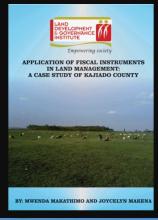/ library resources
Showing items 1 through 9 of 17.The economies of most African countries rely heavily on agriculture and other land and land-based activities such as tourism, mining and livestock production. Indeed, these are the core activities through which African countries participate in the global economy.
Fiscal instruments are tools that governments use to manage revenue and expenditure and therefore influence the growth (or stability) of the various sectors of the economy. Government revenue is derived primarily through taxation.
According to 2001 statistics, 924 million people, almost one third of the world’s population lived in slums. A majority of these people are in the developing countries and they account for 43% of the urban population.
Kenya is currently implementing a number of large scale infrastructure and development projects aimed at trans forming the country into a newly industrializing, middle-income country.
THE MINING ACT No. 12 of 2016
Date of Assent: 6th May, 2016
Date of Commencement: 27th May, 2016
COUNTY GOVERNMENTS ACT NO. 17 OF 2012
Date of assent: 24th July, 2012.
Date of commencement: See Section 1.
In Kenya, insecure land tenure and inequitable access to land and natural resources have contributed to conflict and violence, which has in return exacerbated food insecurity. Most farmers in Kenya have no legal title for the land on which they farm.
A Land Information Management System (LIMS) is an information system that enables the capture, management, and analysis of geographically referenced land-related data in order to produce land information for decision-making in land administration and management.
The first set of the land laws were enacted in 2012 in line with the timelines outlined in the Constitution of Kenya 2010.
Pagination
Land Library Search
Through our robust search engine, you can search for any item of the over 73,000 highly curated resources in the Land Library.
If you would like to find an overview of what is possible, feel free to peruse the Search Guide.









